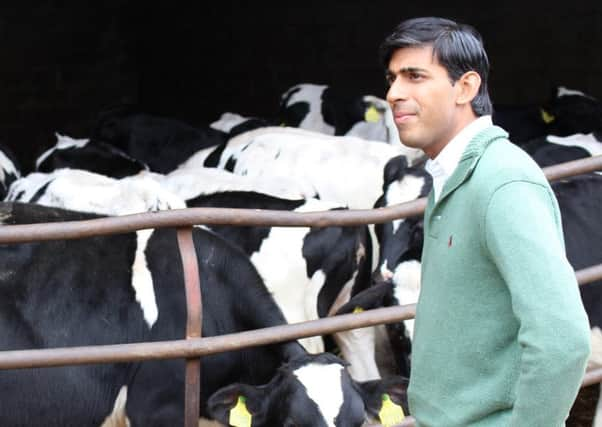Rishi Sunak: Brexit would be route to freedom for our farmers


Known as the ‘sow stall’, this method of intensive farming sees the pigs confined in such a small space that, by the later stages of pregnancy, they become too large to lie on their sides, forcing them to sleep on their chests.
In 1999, the UK became one of the first countries in the world to end the practice. It was the right thing to do, but as a result of EU rules, it was British farmers that lost out. Undercut by less scrupulous producers on the continent and powerless to protect our own higher welfare farmers, the number of pigs being raised in the UK fell by 40 per cent.
Advertisement
Hide AdAdvertisement
Hide AdFor British farming, the reality of EU membership has been to pile on regulations we don’t need while robbing us of the protections we do.
I’ve been working with Fresh Start, a group of MPs seeking to define a positive vision of what a post-Brexit UK could look like. Given how important farming is to my constituency, I decided to set out what I believe Brexit would mean for British agriculture.
From the width of hedgerows to whether cabbage and cauliflower can be considered the same crop, there are few decisions British farmers are allowed to make without the long arm of Brussels meddling in the details.
Today, 80 per cent of farming legislation affecting the UK is made in Europe. So baffling have the intricacies of these regulations become that British agriculture is currently fined an average of £7,300 an hour for failing to comply with the letter of the European law.
Advertisement
Hide AdAdvertisement
Hide AdDespite these abject failings, the hearts of many farmers are understandably divided about the upcoming referendum.
Much of that is down to the EU’s Common Agricultural Policy (CAP), a scheme that provides some £3bn annually of vital support to the industry.
Money that, for many farmers, is the difference between sustainability and bankruptcy.
On closer inspection, however, even this ends up as a raw deal for Britain – £3bn sounds a lot, but it’s considerably less than the £13bn the UK contributes to the European budget.
Advertisement
Hide AdAdvertisement
Hide AdIn fact, UK farmers not only receive less support than almost any other EU nation, they also suffer the lowest levels of EU rural development expenditure on the continent.
Were we to leave the EU, Britain would find itself with enough money to fund CAP at current levels and still have an extra £10bn a year to spare.
The Prime Minister has commendably committed to put in place a British Agricultural Policy in the event of Brexit.
Far from a leap in the dark, this would put us on the same path as the US, Norway, Switzerland and Japan – all of which have managed to implement extensive agricultural support programmes from outside the EU.
Advertisement
Hide AdAdvertisement
Hide AdA new British farming policy could maintain financial support whilst reducing cumbersome EU red tape and inspections and back innovative support like crop insurance schemes.
Another popular bogeyman amongst EU enthusiasts is that, outside the EU, British farmers would no longer be free to sell their produce to continental markets. The reality is that a sensible free trade deal is in everybody’s interest and a likely outcome.
Britain buys more than double (€40bn) the agricultural produce from Europe than it sells to it (€16bn), something that also holds true individually for poultry, pork, beef and dairy.
Given how little excuse French farmers appear to need to roll their tractors up the Champs Élysées, it hardly seems plausible that European governments would be able cut themselves off from one of their most lucrative customers just to prove a point.
Advertisement
Hide AdAdvertisement
Hide AdCan you imagine French wine growers being happy at their multi-billion export industry being subject to a 30 per cent tariff?
In any case, handing over control of our trade policy to Brussels has not served farmers well.
Developing economies with emerging middle classes like India and China are vital markets for the future of UK food.
Yet, while independent countries like Switzerland and Australia have rushed ahead in striking free trade agreements with these nations, the EU has failed to make a single deal with a top 10 economy.
Advertisement
Hide AdAdvertisement
Hide AdThe future of British agriculture is one in which we all have a stake. Without its farmers, our country’s landscape would soon see its lush fields turn to scrub, its hedgerows left unmanaged and its dry stone walls unrepaired.
Time and time again, Europe’s bureaucrats have let down this vital industry. It’s about time we put them out to pasture.
Rishi Sunak is MP for Richmond and a member of the Environment, Farming and Rural Affairs Select Committee.